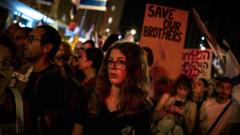Is Netanyahu the Key Obstacle to Bringing Hostages Home?

Published: 2025-09-14 02:30:20 | Category: world
Families of Israeli hostages held by Hamas are increasingly vocal in their accusations against Prime Minister Benjamin Netanyahu, claiming he is the primary obstacle to their loved ones' return and a peaceful resolution to the ongoing conflict. Their statements follow a series of military actions that they believe undermine potential negotiations for hostages’ release. This article explores the evolving situation, the implications of recent events, and the perspectives of those directly affected.
Last updated: 07 October 2023 (BST)
Key Takeaways
- Hostage families accuse Netanyahu of obstructing peace efforts and the return of captives.
- Israel's recent military strike in Qatar reportedly killed Hamas leaders, heightening tensions.
- US Secretary of State Marco Rubio expressed discontent over Israel's actions but reaffirmed strong US-Israeli relations.
- The humanitarian crisis in Gaza escalates, with thousands of civilian casualties reported.
- International entities, including the UN, warn against the humanitarian fallout of military offensives in Gaza.
Background of the Hostage Crisis
The current crisis began following the Hamas-led attack on southern Israel on 7 October 2023, resulting in the deaths of approximately 1,200 individuals and the kidnapping of 251 others. The situation has rapidly worsened, leading to a significant humanitarian crisis in Gaza, where Israeli military operations have resulted in high civilian casualties.
Netanyahu's Role and Public Perception
Prime Minister Benjamin Netanyahu has faced severe criticism from the families of hostages. They argue that his military strategies and political maneuvers are detrimental to negotiations for their release. The Hostages and Missing Families Forum: Bring Them Home Now publicly stated that Netanyahu's actions are merely excuses to prolong his tenure in power while endangering the lives of the hostages.
Military Actions and Their Consequences
On a recent occasion, Israel conducted a strike in Doha, Qatar, targeting senior Hamas leaders. This operation reportedly resulted in the deaths of five Hamas members and a Qatari security official. Netanyahu defended the action, asserting that removing Hamas leadership is crucial for ending the hostilities and facilitating hostage releases.
International Reactions and Diplomatic Implications
The strike drew global condemnation, with US Secretary of State Marco Rubio expressing dissatisfaction on behalf of President Donald Trump. Rubio acknowledged the strong US-Israeli relationship but emphasised the need for a strategic reassessment moving forward. He noted Qatar's role as a crucial US ally in the region, complicating the diplomatic dynamics following the strike.
Humanitarian Crisis in Gaza
As military actions intensify, the humanitarian situation in Gaza deteriorates. Israeli forces have escalated their assault on Gaza City, leading to widespread destruction and significant civilian displacement. The Israeli Defence Forces (IDF) reported that around 250,000 people have fled south in anticipation of a major ground offensive. The United Nations has warned that the ongoing military escalation threatens to exacerbate an already dire humanitarian disaster.
Casualties and Humanitarian Impact
Recent statistics from Gaza's Hamas-run health ministry indicate that approximately 64,605 individuals have died due to Israeli air strikes since the start of the conflict. The scale of the casualties raises serious questions about the humanitarian implications of military strategies employed by Israel and the potential for long-term instability in the region.
Hostage Families Demand Action
Families of the hostages continue to advocate for immediate action from the Israeli government. Their statements reflect a deepening frustration, as they perceive Netanyahu's military operations as counterproductive. They claim that the ongoing military strategy not only fails to secure the release of their loved ones but actively endangers their lives.
Conclusion: What Happens Next?
As the situation continues to evolve, the prospect for peace remains uncertain. The families of hostages are adamant that the current approach is inadequate and urge the Israeli government to seek alternative solutions. The international community watches closely, hoping for a resolution that prioritises human lives over political gains.
The ongoing conflict raises critical questions about the balance between military action and humanitarian considerations. As the situation develops, it remains to be seen how Israel, Hamas, and international actors will navigate this complex landscape. How will the Israeli government adapt its strategy to address both the hostage crisis and the humanitarian fallout in Gaza? #HostageCrisis #GazaConflict #PeaceNegotiations
FAQs
What is the current situation regarding Israeli hostages held by Hamas?
As of now, Israeli families are voicing concerns that Prime Minister Netanyahu is hindering efforts to secure the release of hostages taken during the 7 October attack, amidst ongoing military operations in Gaza.
What has been the international response to Israel’s military actions in Qatar?
The international community, particularly the US, has expressed dissatisfaction with Israel's military operations, indicating a potential strain on diplomatic relations, especially regarding Qatar's role as a US ally in the region.
How many casualties have been reported in Gaza since the conflict began?
According to Gaza's Hamas-run health ministry, approximately 64,605 individuals have been killed in Israeli attacks since the conflict escalated, highlighting the severe humanitarian crisis in the region.
What are the families of the hostages demanding from the Israeli government?
The families are demanding immediate action and alternative strategies from the Israeli government to secure the release of their loved ones, expressing frustration over the current military-focused approach.
What role does Qatar play in the Israeli-Palestinian conflict?
Qatar is considered a key mediator in the region and has previously facilitated communication between Hamas and other international actors. Its involvement is crucial for diplomatic efforts to address the ongoing crisis.



